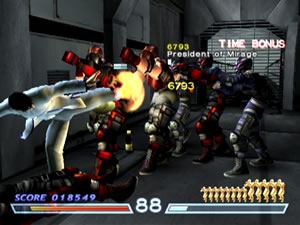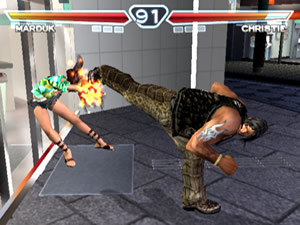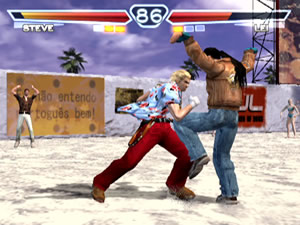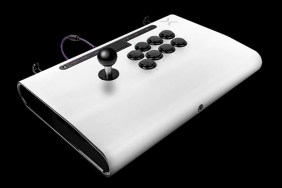Round 4 is a draw.
The fighting game genre seems to have passed its prime. The craze of Street Fighter
games and their clones has calmed to a murmur. Even the multitude of 3D fighters
like Virtua Fighter, Tekken, Bloody Roar,
Dead or Alive and a few others have left many
of us pining for something new. Now two titles, Virtua
Fighter 4 and Tekken 4, vie for control over the consumer’s ever-waning
interest in this once proud genre.
While it was very fun, VF4 stopped short of true innovation. The result
is a game that affectionately plucks the heartstrings of its diehard fan base
by adding a few new goodies.
However,
those looking for something new in their fighting game experience might as well
be waiting for the Second Coming, as Tekken 4 suffers from the exact
same problems with of a few of its own thrown in for good measure. Again, the
veterans will be the few to appreciate the game’s minor but savory refinements.
Plus, Tekken Force makes a return and finally we see a full replay feature.
But before I start on the sweet creamy center, let’s bite into the flaky cookie crust, which is ever-so flaky.
Supposedly, the martial art community holds a totally arbitrary event known as the King of Iron Fist Tournament, and this is the 4th in the series. Twenty fighters (and apparently robots and panda bears) from all over the world meet to compare bench-press achievements and see who has the skull most resistant to severe pummeling. Each character has his/her own lame-ass story for why they’re there, which has zero representation during gameplay. The ending cinema sequences are longer than they have ever been and yet still manage to be short and make little sense.
With the absence of the tag feature found in Tekken
Tag, the game plays like your garden-variety fighter with the new ability
to walk in an arc around your opponent, either left or right. This helps a great
deal when a sidestep just isn’t enough.
The major difference in fighting systems between VF and Tekken
is VF‘s Punch, Kick, Guard button style vs. Tekken utilizing a
button for each limb and requiring the player to press Back to block. VF4
made a good breakthrough with many more moves and combinations than in previous
versions. Yet still, a button for each limb gives the player more ability to
“freestyle” and come up with their own combinations and ways of linking combos
together.
Tekken 4 builds nicely on this play system, providing convenient and
slick transitions between new and old moves (some of which have been rehashed
thrice over since Tekken 1.) Say, for instance, an overhand punch may
have previously left you momentarily open before you could pull your next attack.
Now, the game sports slick in-between transitional moves to retaliate with just
when you might think you were exposed and susceptible to counter-attack. So
an upper-cut or low sweep may follow that descending overhand punch.
This speeds up gameplay, prevents easy “juggling” and can stop combos dead
in their tracks. Toss in the existing counter-attacks and the new humiliating
counter-counter-attacks and you can see how veterans might get excited about
Tekken 4.
Also new to the game are destructible obstacles and enclosed arenas complete with walls to become pinned against. Both add a sense of realism not found in previous versions, but some of the enclosed arenas are crummy, such as the sucky industrial laboratory. It’s too small and has the most annoying echo. Not to mention, it’s easy to get pinned against the wall and hammered with a series of crushing combos.
There is a simple move each character can perform to move their opponent in a variety of different directions, one of which is switching positions, thereby placing their assailant against the wall and returning the punishment.
 One
One
of the game’s less notable additions comes in the form of 2 1/2 new characters.
Enter Steve Fox, British Middleweight boxing champion – no kicks, but a lot
of impressive punches with a cool bob ‘n weave style that would make Sugar Ray
proud. Next is Marduk, an 8-foot Vale Tudo fighter who specializes in bone breaking
maneuvers and submission holds. Last is Christie Monteiro, a student of Eddy
Goro and famous for her balletic Capoeira. However, most of her moves are rehashed
Eddy attacks.
Then there’s Jin, who isn’t really new, but he has unlearned the Mishima style of boxing and is now the only recurring character with a completely new set of moves. Great for new players, but a sharp thorn to those who spent many nights honing their Kazama skills.
Incidentally, there are several modes, all roughly familiar, in which to cultivate
your preferred character’s style. Survival, Arcade, Story, Practice, Time Attack,
Team Battle and the Final Fight inspired Tekken Force. All of these should
be pretty self explanatory, but Practice and Tekken Force deserve some elaboration.
Practice is essentially the same as always – take a character in and you can
watch and/or attempt said character’s moves, throws and combination. You may
also set the CPU controlled character to attack, crouch, counterattack, block,
etc. Moreover, you can now save combos to file and replay them just in case
you pulled a stellar “custom” combo and want to remember how to pull it off
again later.
Tekken Force is a refreshing single player break from the 1-on-1 norm. Pick
a character and traverse through a series of levels devoid of any real story.
In the vein of the classic Kung Fu or Fighting Force, you are
thrown waves of enemies that are ever increasing in difficulty as you progress
through industrial type environments. You have each character’s full compliment
of moves at your disposal, which makes for some pretty cool sequences. Plus,
the camera problems that plagued the last Tekken Force have been addressed with
improved angles, and enemies no-longer smack you around from off-screen.
I haven’t mentioned much about the aesthetics, because they’re just barely
next generation. Sure, edges are rounder and smoother than the PSX versions
or Tekken Tag and there are definitely more colors on-screen, but the
textures don’t impress at all. I expected more detail for the full-fledged sequel
to Tekken 3 on the PS2. At least
you are given a cool option to save entire matches to watch as replays (even
if the match is set for 5 rounds!)
But despite the game’s improvements and refining, you’re still fighting 1-on-1
in a confined, pseudo-3D environment with rehashed moves. I love the Tekken
series and it easily has the better-looking fight scenes of the two remaining
heavyweights in the genre with its counter-counters and slick transitions. But
Namco has played it safe with Tekken 4, only refining what they have
previously done well and taking absolutely no real chances on innovation. It
is fun for the converted, but the congregation isn’t getting much bigger.

-
Classic Tekken fun
-
Great transitional moves
-
Better Tekken Force
-
Replays...finally!
-
Feels old
-
No real character selection improvements
-
Graphically lackluster










